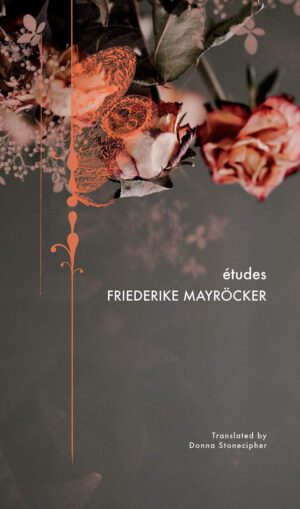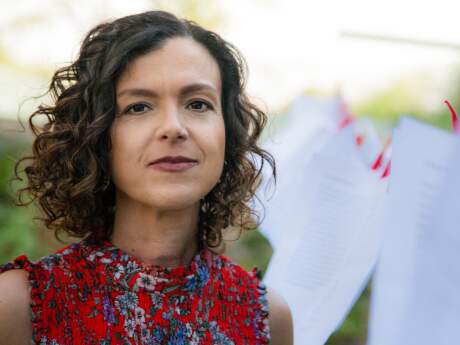In Their Own Words
Donna Stonecipher on translating Friederike Mayröcker
from études
oh you my green branchlet with your
sweet doublet like your white blossoms sprouted
out of my heart with this green
doublet oh you my sweet branchlet oh you my
green branchlet with your sweet doublet ……..
like your white blossoms sprouted
out of my heart – the green doublet the green
dart of the season ……..
“les études” in the heart the branchlets and lips of snow little petals in my heart stag beetles fuchsias, I lied, don’t want to eat anymore don’t want to drink anymore just want to go into the clouds, Marie, I have raging winglets, Marie, I kiss you on each cheek, Marie, ach, furor, Fauré, was in pain, was in tears, Marie, because my heart as invisible as 1 monument, Robert Musil, ached and sniffled a bit dreary &c., in the moment of awakening, Marie, with snow in my hair and snow in my eyes ++++++++++ with blossoms, snow, back then the branchlets of the cherry tree feeling their way through the open window, nights, partridge and heather and on the paths, the tears, on the paths the tears while the birdlets on their blue spoors how I feel around for their hearts, and how I press them to my heart, fuchsias for miles and miles of fuchsias, Marie, at your lip, Marie, you whistle bird, Marie, wings, ferns, Marie, morning-waft of April ach rosé, 1 little bit ach Fauré, dash holy water on lily of the valley bouquets, Marie, and all things must be subservient, Marie (and became a 6-sided face from it ++++++++++), Marie
4/28/11
Translated from the German by Donna Stonecipher.
From études published by Seagull Books. Copyright © 2020.
On translating Friederike Mayröcker
Austrian poet Friederike Mayröcker is one of the most admired European poets of the last century. Still writing prolifically and innovating fearlessly at 95, in her 2011 volume études
she continued to break new ground for the prose poem, using the musical motif of an étude (“an instrumental musical composition, usually short, of considerable difficulty, and designed to provide practice material for perfecting a particular musical skill”) to experiment with new modes of exploring consciousness via association, repetition, memory, and fragments.
The poems are all date-stamped and have a diary-like quality—everything from harrowing grief to doctor’s appointments to beloved music to childhood memories to anecdotes of literary crushes to responses to contemporary artworks make up the content of the poems, which raw material is then wrought by Mayröcker into her études.
What I love about this poem is how she uses the name “Marie” as a kind of rhythmic device or punctuation structuring the typically unruly flow of thoughts that are introduced here—from a mini health report (“ached and sniffled a bit dreary &c.”) to the desire to metaphysically vanish (“just want to go into the clouds, Marie”) to visceral emotional archeology (“back then the branchlets of the cherry tree feeling their way through the open window”) to adaptations of well-known quotes (Robert Musil’s “There’s nothing more invisible than a monument”), etc. Who is Marie? Perhaps a friend or loved one from the present or the past; perhaps T. S. Eliot’s “Marie” of “Marie, Marie, hold on tight” in The Waste Land (a poem that gets mentioned in the études); perhaps the mother of Jesus; perhaps nobody. Perhaps she is all of the above, but as the unknown addressee of the poem, her name takes on mysterious resonance.
Another thing to note about this poem is its long “epigraph”; Mayröcker plays often with this convention of the printed page in this volume—some of her epigraphs are longer than the poems they sit atop, and they are usually written by herself rather than being a quotation from another writer. It could be a means by which Mayröcker can split into two consciousnesses within the space of singly authored poem; it could also be a way of interrogating the asymmetrical relationship between quoted and quoter. Or she could have had something else in mind entirely.
One of the joys of translating poetry as a poet is that I get to “write” a kind of poetry that I adore but never would have produced myself. I get to “think” with the mind of a rigorous and brilliantly inventive Viennese poet setting out on whatever poetic adventure beckons that particular day, in this case April 28, 2011.



